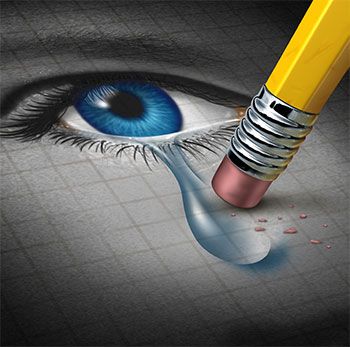Depression is not a sickness, it’s a disease.
Clinical psychologist Priyanka Fernandes dispels the myths behind it and suggests measures to steer clear of it
 The newspapers these days seem to be filled with reports on suicides.
The newspapers these days seem to be filled with reports on suicides.
The victims come in all sizes -- adults, children, teenagers, men and women.
The immediate reaction to these reports is often 'What could a school-going kid possibly be stressed about?'
And before you know it the suicide becomes the element of gossip.
How many of us try to understand the truth and the misery the individual must have gone through to take such a drastic step? Rarely.
The same is the case with celebrities who battled depression but decided to give up -- Robin Williams, Whitney Houston, Heath Ledger, etc.
While many give up, there are also those who have successfully battled it -- Ben Stiller, Jim Carrey, JK Rowling, Billy Joel, Stephen Fry, Brooke Shields and Owen Wilson to name a few.
What is depression?
Depression does not discriminate between a children and adult, rich and poor or man and woman.
You may have everything in life, what people envy you for, and you can still be a victim of depression.
All that varies between individuals is the cause and the degree to which one feels depressed.
Understanding depression is very important today as it is spreading and gaining increasing ground, especially among youth all around the world.
Depression is defined as a state in which an individual is in a low mood that often negatively affects his or her thoughts, behaviour and daily functioning.
It is usually caused due to psychological facts, but it could also be an outcome of certain time-bound life events, medical conditions, nutritional deficiencies or side effects of medical treatments.
Clinically speaking
In psychiatry, depression falls under the broader spectrum of mood disorder, the two best-known of which are major depressive disorder commonly known as clinical depression or major depression and bipolar disorder commonly known as 'manic depression'.
In general, depression is very subjective and is caused by various factors such as trauma, a difficult childhood, abuse, drug usage, death, strained relations, loss, injury and other external events as well.
It can also be caused by genetic and biological factors like developmental problems in the womb or exposure to certain toxins which lead to the development of depression.
The 'happy' chemical
Certain levels of chemicals in the human mind called the neurotransmitters are believed to play a major role in individuals suffering from depression -- serotonin is one.
Serotonin not only regulates our moods but appetite, sleep and certain cognitive functions too.
Low levels of serotonin are believed to be one of the primary reasons for depression.
Another important neurotransmitter that has recently gained focus is dopamine.
Individuals with low dopamine are observed to suffer difficulties with memory, thinking, organisation and experience an inability to feel pleasure.
The symptoms
Anxiety, confusion, loneliness, crying spells, low self-worth, feelings of sadness, hopelessness, guilt, anger, hurt, etc are symptoms of depression.
If one has been feeling most of the above symptoms over a period of two weeks it is important to seek help.
Initially if the depression is caused by environmental stressors one can speak to family or close friends. But if that doesn't help, consulting a professional psychiatrist, therapist or counsellor is important.
'Shrink' your problems away
Visiting a psychiatrist or a psychologist is still considered a taboo in India, which is one of the reasons why individuals try battling their emotions on their own.
While some become dependent on other individuals or groups many others choose to escape their problems by indulging in vices like smoking, drinking and drugs.
There are also those who become helpless and confused about the situation they're in and decide to take their own lives.
You are not alone
Each of us has an equal right over happiness. Hence seeking help must from a professional must not be looking at as being shameful.
In the same way a person down with a fever or the common cold visits a doctor, a person battling depression must contact a psychologist to get well.
There is hope
Depression can either be battled medically or psychologically or with a mixture of both.
If a person's depression is chronic, medication along with therapy is recommended as medication helps the chemical imbalance while therapy helps the individual become a self-reliant and fully-functioning individual who can cope with stress in the present as well as in the future.
Contradictory to popular belief, anti-depressants do not have as many side effects as before.
Today doctors are more cautious of individuals becoming dependent and abusing these medications and hence take several precautionary measures.
A psychiatrist clinic is no longer a place where doctors just meet the client for a brief period and prescribe medication.
It is more of a centre where they work with psychologists or therapists to conduct evaluations, diagnoses and then recommend treatment.
Take control of your emotions rather than becoming the victim and accepting sadness as a part of your destiny.
As Robin Williams once said, "You're only given one little spark of madness. You mustn't lose it."
How to ward off depression
- Stay positive
- Avoid stress
- Find a hobby, do more of it
- Meet people, make friends
Photograph: Heather Santo/Creative Commons
ALSO SEE
- 5 yoga poses to rid you of depression
- Top foods to help fight depression
- Is depression curable? Of course it is!
Courtesy: YouthIncMag.com











